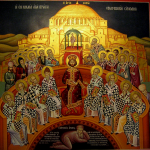Little Sins Mean A Lot is a book about the bad habits we have, our venial sins, which can add up to a lot of damage if we’re not careful. I read through this book in one day, finding bits of myself in most of the chapters. Each chapter starts off with a story or several stories that relate to the topic of the chapter. There are quotes from the saints, the Catechism, and Bible verses to show what Catholicism has to say about these little sins. The third part of the chapter looks into how we can break those bad habits. The book isn’t too long, but each chapter packs up a whole lot in a relatively short amount of pages.
I like that the book gives a lot of starting points in terms of identifying and breaking the bad habits. My favorite chapters are the ones that center on procrastination, small indulgences, and “clinging to our narratives beyond their usefulness.” I’ll go into detail on these so that you can get a sneak preview of why I like this book so much.
Procrastination: Like a lot of other writers, I struggle with procrastination. I am way too easily distracted by the latest hashtag or whatever notifications go off on my phone and I tend to dedicate more time to my “short time wasters” than I should. In true Dante-esque fashion, Elizabeth Scalia counters this bad habit with an example from Mary: The Annunciation. Since I consecrated myself on the feast of the Annunciation, I found myself wanting to imitate Mary’s example. There are several root causes to why we procrastinate and Elizabeth tackles every single one of them.
Small Indulgences: Ask those who know me best and they will tell you that I always love to treat myself whenever I get the opportunity. Usually, it comes in the form of food. It’s okay when it happens once in a while, but too much indulging will lead to cravings for more of whatever you indulge in. In other words, small indulgences can be an addiction if we’re not careful. I particularly like how she suggests asking the saints and our guardian angels for help. One example I can give (and trust me, I never get tired of telling this story) is when I wanted to indulge myself at a convention by having the actor I was gonna meet take a picture with him pretending to bite me, vampire style. However, my guardian angel suggested otherwise, leading to a more heroic picture that’s still one of my favorites to this day!
Clinging To Our Narratives Beyond Their Usefulness: An alternative title I have for this chapter is “Selling Ourselves Short.” As a writer, this chapter felt particularly personal for me because I practically worship the idea of “the narrative.” I always see my life as a huge, neverending story. Except I also know that way too many people cling onto their “victim narratives” in order to justify why they act a certain way. One friend told me that she thought that I hid behind my writing. I don’t think that I use my writing as a shield, but I’ve been defining myself by this narrative that I created for a very long time. The chapter calls for detachment, to let God write our story instead. The only other thing I would add is a suggestion about what true humility looks like. As CS Lewis said: “True humility is not thinking less of yourself; it is thinking of yourself less.” As in thinking of yourself less often than you normally do.
I think the biggest lesson that can be learned from this book is that it completely and totally destroys the lie that “as long as you’re not doing harm to anyone, you’re a good person.” These little habits can harm ourselves and others in a big way if they are taken too far. We all have times when we procrastinate, indulge a little too much, and sell ourselves short. We can swing from being too full of ourselves to outright hating ourselves. The trick to all this is finding balance. I highly recommend this book to everyone, especially to 12-step programs.













